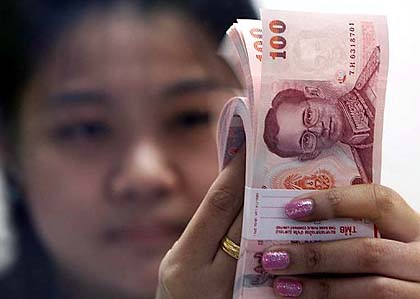Understanding Thai Taxes: Personal Income Tax, Tax Rates, Filing of Returns & Payment of Tax and Withholding Tax

Personal Income Tax: The tax year for individuals is the calendar year. Tax residents are subject to tax on assessable income from sources in Thailand and on assessable income derived from sources outside Thailand if remitted into Thailand in the same year. A person who resides in Thailand for one ore more periods totaling 180 days or more in a tax year is deemed to be a tax resident for that year.
Non-residents in Thailand are subject to tax only on the income they earn from sources in the country, regardless of whether such income is paid in or outside the country.
Expatriate employees working outside Thailand for a regional operating headquarters or a qualifying international procurement centre may be able to claim exemption from Thai personal income tax.
For some classes of income, standard deductions will apply, whereas for others, actual expenses incurred in connection with the derivation of the income may be deductable.
For employment income, a standard deduction of 40% of an individual’s gross income, up to a maximum of BT60,000 ($1194) per annum, may be claimed as an expense.
In addition to the itemized or standard expense deductions, individuals are also entitled to deduct a number of allowances.
Tax Rates: Personal income tax will be calculated on a person’s net income after deduction of expenses and allowances. The tax rates for both resident and non-resident tax individuals are set out in the table below.
|
Income Tax Bands |
|
|
Net taxable income (BT) |
Marginal tax rate |
|
1-150,000 150,001-500,000 500,001-1,000,000 1,000,001-4,000,000 4,000,001-above |
Exempt 10% 20% 30% 37% |
|
Source: BDO Advisory |
|
Expatriate employees working for a regional operating headquarters or qualifying international procurement centre may elect to be taxed at a flat rate of 15% on their remuneration.
Filing of returns & payment of tax: Personal income tax returns must be filed on or before 31 March in respect of the receding calendar year. Any outstanding tax on this income must also be paid on or before this date.
Employment income and certain other categories of income are subject to withholding tax. The taxpayer can claim a credit for the tax withheld in their personal tax return.
For married couples, the husband is normally responsible for filing a joint return and paying any tax due. However, if desired a separate return may be filed by the spouse in respect of employment income only. The tax liability will be lower if separate returns are filed. Mid-year returns must be filed for certain types of income, such as rents and income from certain professions and businesses.
Under certain conditions, assessable income may be excluded from the personal tax return, including certain types of interest that has been subject to 15% withholding tax; gains from the sale of immovable property acquired by way of bequest or as a gift, which would have been subject to a withholding tax at the time of transfer; and dividends or mutual fund distributions subject to 10% withholding tax.
Withholding tax: Thailand has a comprehensive withholding tax system that applies to both domestic and international payments.
Withholding tax applies to a number of domestic payments that are not for the sale of goods, including service fees, royalties, commissions, transport fees, interest, dividends, rents and the sale of immovable property. Rates generally range from 1% to 5%. Withholding tax must be deducted at the time of payment, as well as a certificate issued by the payer as evidence of the tax deducted. The withholding tax deducted can be used by the income recipient as a tax credit in their income tax return.
Certain payments made to foreign companies that are not carrying on business in Thailand, including interest, capital gains, rents, royalties and service fees are subject to 15% final withholding tax. Dividends are subject to 10% final withholding tax, however, exemptions apply in some cases, such as for dividends paid out of profits subject to tax holidays.
An exemption or reduction of withholding tax may be obtained under an applicable double tax agreement. Service fees are usually exempted and the rate on interest is generally reduced to 10% if paid to a financial institution.
(Page 245-246 of The Report : Thailand 2012, published by Oxford Business Group)














